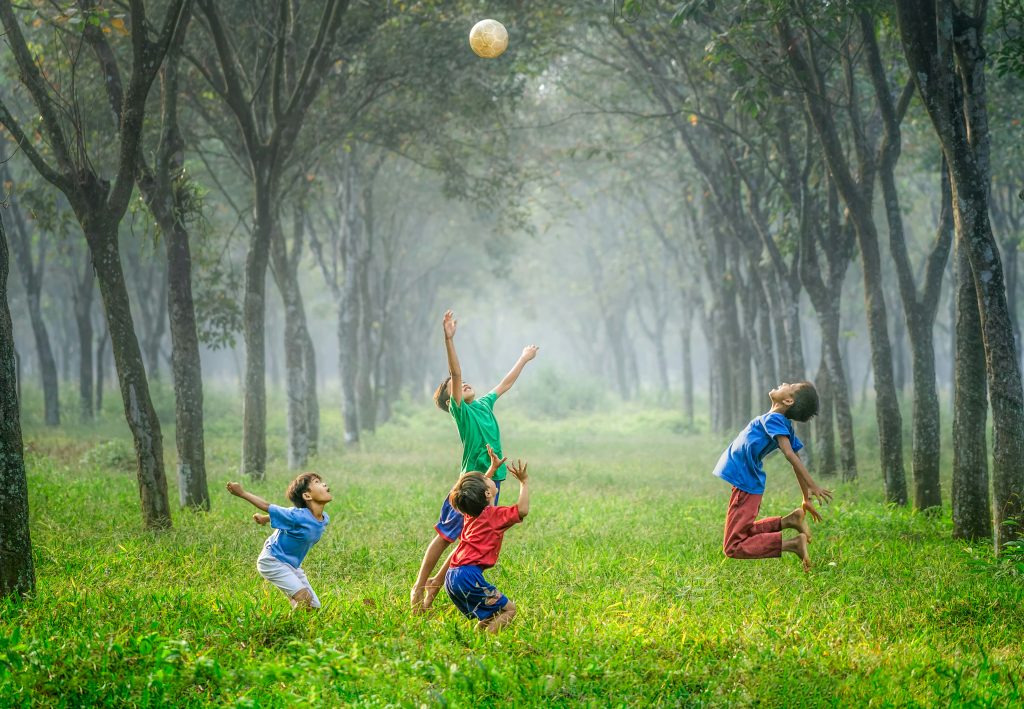By Rabbi Diana Gerson and Samantha Schulman
In June, 2024, at the G20 Interfaith Forum in Manaus, Brazil, Rabbi Diana Gerson and Samantha Schulman presented “Live, Learn, Play, and Pray: Sacred Ecology and Sustainable Development.” This presentation, part of a series exploring the intersection of faith, environmental stewardship, and sustainable development, aimed to highlight the crucial role of faith communities in addressing pressing global challenges. The G20 Interfaith Forum serves as a platform for religious leaders and faith-based organizations to engage with global economic and development agendas. In the context of increasing environmental challenges and their disproportionate impact on children and vulnerable communities, Gerson and Schulman’s talk focused on sacred ecology as a framework for understanding and addressing the interconnected issues of environmental degradation, child welfare, and sustainable development, drawing on diverse religious traditions and contemporary initiatives to illustrate faith-based approaches to these global concerns.
– – –
My colleague Rabbi Daniel Swartz, Executive Director of the Coalition on the Environment and Jewish Life, begins his presentations with the following exercise: Everyone, please close your eyes. Now, visualize your favorite place in nature. What images come to you? Do you have a clear picture? Now, opening your eyes, can you raise your hand if your images have any people in them?

We tend to generate images of pristine, undisturbed wildlife and spaces when considering the environment. There is a notion that human beings are disruptors in nature and not intrinsic parts of it. Sacred ecology is a critical framework that can deconstruct perceived separations of environmental and human issues.
All faiths believe that children are important and deserving of care and protection. Most of the world’s faiths emphasize the unique value of children, not as vessels for future adults but for who they are today. Many faiths also emphasize care for creation and the natural world to build upon the world we know today. Children and the natural world are the agents of the future; however, to create a hopeful future, we must also protect them in the present. How can we help them grow in mind, body, and soul when their health is compromised by polluted air, land, and water? Whether it is an industrialized zone with bad air, a river filled with trash, or chemicals leaching into the soil, children across the globe are forced to live in conditions that will impact the rest of their lives. How can a child have a healthy, fulfilling life if the core spaces in their homes and communities do not have access to clean air, soil, and water?
While it can be significant and impactful, stewardship must extend beyond planting trees, recycling, and individual behavioral shifts. Stewardship must embody care for creation and all beings locally, globally, and systematically. Climate change invokes particularly damaging spiritual, physical, and emotional crises in which children inherit a neglected future. This moment is not only a crisis of ecological collapse, resource scarcity, and intensifying natural disasters but a crisis of love and care.
Today’s environmental changes are one of many global instances in which children have been silenced and generational futures sacrificed. Across the globe, children are forced to grow up in compromised situations. Warfare, poverty, and inequality chip away at childhood and intensify situations in which the world surrounding children is polluted, destroyed, and lacking love. Most of the world’s faiths emphasize the unique value of children, not as vessels for future adults but for who they are today.
Today’s families, children, and youth know their well-being is threatened. Environmental justice is essential to addressing child safety and security due to the multifaceted impacts of human-caused environmental change and ecological degradation. Instability has diverse drivers and impacts, including armed conflict, resource scarcity, natural disasters, societal collapse, and human rights abuses.
Extractive and exploitative economic, social, and political practices intensify instability and degrade critical ecological systems that support healthy environments.
As our friend Professor Katherine Marshall highlighted yesterday, the role of religion, faith and people of moral conviction is increasingly essential in the sustainable development space and critical in the sacred work of stewardship of our home, Earth.
Today’s climate crisis is the epitome of today’s poly-crisis driving and driven by cycles of violence. However, its effects are not felt equally; levels of risk to climate-driven violence are informed by vulnerability. Intersections of vulnerabilities, such as poverty, inequality, gender discrimination, and ability, put children at greater risk of climate disasters and injustice. Furthermore, exposure to cycles of violence that compromise children’s safety and security further increases difficulty in responding to and recovering from environmental crises. Considering the disproportionate impacts of today’s environmental changes and environmental injustice, interfaith, intergenerational, and intercultural groups need to collaborate and coordinate efforts on local and global scales.
A commitment to stewardship and climate justice demonstrates the role of sacred ecology in ending violence against children and safeguarding families.
Ecological justice scholars and activists have advocated for meaningful change to focus on the spaces that constitute the human environment: where we live, learn, play, work, and pray. Space-focused reframing has expanded upon issues of social inequality and human health, focusing on how core spaces of human existence become compromised in the first place. In pursuit of just interfaith, intergenerational action, we must critically examine the driving aspects of vulnerability and inequality in heavily impacted areas that increase risk and diminish resilience capabilities. Our actions must realign how we are supposed to value children with the Earth that is created for them.
We can establish a faith-informed retrieval and implementation of ecological health principles by focusing on a four-part framework that embodies the spaces children grow up in living, learning, playing, and praying and explores the climate-driven threats in these spaces and how partnerships with children and communities can foster agency and action. Points of focus include the role of sacred ecology and faith actors in establishing the cross-cutting natures of climate change and child well-being, human rights and justice-informed responses to climate change, the role of climate change as a multiplier of vulnerabilities (e.g., economic, social, political, age), and the pursuit of interfaith, intergenerational collaboration.
Living, playing, learning, and praying will collectively encompass physical, emotional, and spiritual impacts on children growing up in the environment.
- “Living” is informed by SDGs 2 – Zero Hunger, 13 – Climate Action, 14 – Life below water, and 15 – life on land and covers the security of home lives, living in harmony with the environment, and existence, consciousness, and development in times of instability.
- “Playing” is informed by SDGs 3 – Good health and wellbeing, 6 – clean water and sanitation, 11 – sustainable cities and communities, and 12 – responsible consumption and production and explores the importance of joy, creativity, relationship building, and children having time to be children.
- “Learning” is informed by SDGs 1 – No poverty, 4 -Quality education, 5 – gender equality, and 10 – reduced inequalities, highlighting the importance of knowledge, exploration, and challenging young minds.
- “Praying” is informed by SDGs 11 – Sustainable cities and communities, 13 – climate action, 16 – peace and justice with strong institutions, and 17 – partnerships and emphasizes the criticality of community care and health, early education of sacred ecology, and communities of faith being safe spaces to explore complicated emotions and spiritual questions.
A stewardship and climate justice discourse must include the role of sacred ecology in ending violence against children. Focusing on these four spaces – where children grow up living, learning, playing, and praying- we can begin to establish a faith-informed retrieval and implementation of ecological health principles.
Children worldwide are experiencing a crisis of care. The world’s children lack a protected Earth treated with love, care, and dignity, and we quickly find a corollary absence of these traits in many aspects of their lives. Children who do not grow up in spaces where they can live, play, learn, and pray in safety face physical, emotional, and spiritual challenges. To be a child in today’s world is to live with multitudes of looming crises and feelings of betrayal toward adults who are supposed to advocate for their futures. Children, imbued with purposeful wisdom, perspective, and compassion, face an existential threat that requires them to grow up faster and foster community care in a state of triage. Climate justice advocates must realize that children are significant agents of change in environmental advocacy. If we do not hear, support, and uplift youth as they cry out for the world at large to care, we continue to disservice them. Rev. Talitha Amadea Aho’s novel, “In Deep Waters: Spiritual Care for Young People in a Climate Crisis,” details her experiences working and learning with youth and offers suggestions on supporting generations that feel unheard, unloved, and afraid. She writes of partnership, collaboration, and balancing empowering youth to lead while safeguarding their ability to be young. Her work centers around SDGs 11- sustainable cities and communities, 12 – responsible consumption and production, 14 – Life below water, and 15 – life on land, highlighting the significance of partnerships, instability, inequality, and processing grief in a rapidly climate-altered reality.

Faith actors play a unique role in lifting children and their families up. We have a moral voice, communal strength and an important role in sustainable development. We must meet this moral moment by pursuing intersectional, holistic approaches to safeguarding physical, emotional, and spiritual health.
Vital, creative and transformative faith-led work is already happening in the field. We have heard so many wonderful examples already this week.
Faith-led initiatives and faith communities play a unique role in lifting up children and their families. We have a moral voice, communal strength and an important role in sustainable development. We must meet this moral moment by pursuing intersectional, holistic approaches to safeguarding physical, emotional, and spiritual health.
— 350.org is an international, youth-led grassroots organization with branches in the USA, Africa, Aotearoa, Asia, Australia, Canada, France, Germany, Indonesia, Japan, Latin America, the Pacific, the Philippines, Turkey, the UK, and the Netherlands. A foundational value found in all of 350’s work is that the climate justice movement is a movement for everyone, by everyone.
— FFOP is a global interfaith coalition working to unite religious communities to mitigate the effects of climate change. FFOP works with the understanding that faith communities are essential to shifting the global narrative around environment and stewardship.
- GreenFaith is an international, multifaith, grassroots organization that advocates for justice-informed societal shifts. GreenFaith recognizes that climate change does not exist in a vacuum. A complex interaction of social, cultural, political, and economic values causes the most significant harm to those who have contributed to it least. Without justice, our responses to the current climate crisis will continue to harm those most vulnerable to abuse and exploitation.
Youth advocates have emerged as critical leaders in climate and environmental discourse and action. Many youth-led grassroots organizations have shifted their focuses to include understandings, responses, and solutions to climate change through the lens of human rights, whereas environmental justice advocates for the fundamental human right to live in healthy environments.
- CYNESA is an international organization dedicated to empowering and identifying Catholic youth leaders to take action against environmental degradation in Africa. Representing ten countries, members work within parishes, schools, and youth movements to build meaningful partnerships between concerned groups.
- ClimaLab is a Columbian NGO created by youth that responds to the climate crisis with a human rights focus. Focusing on the groups most vulnerable to climate change, its work areas include targeted territorial responses, policy, education, and participation in events such as COP28.
- 350 Pacific Climate Warriors, a grassroots organization representing the Pacific Islands and diaspora, utilizes an intergenerational, culturally-informed activism model to empower youth and amplify the voices of frontline communities in the climate crisis. 350 Pacific Climate Warriors, 350. org).
The IAFSC is committed to expanding upon the current field of multifaith, intergenerational environmental advocacy to fortify existing avenues of work and develop newer, under-utilized action strategies. Current advocacy strategies include divestment from fossil fuel and other extractive industries, conscious investing in programs and organizations that champion environmental justice, financial aid, disaster relief, developing equity in education and healthcare, and activity in policy arenas. Interfaith and intergenerational activism will be reinforced by expanding global access to accurate information and translation tools to better connect the critical work of grassroots advocates in affected regions. Supporting long-term adaptive and emotional resilience is crucial to helping children in untenable spaces.
Faith leaders can influence the importance of climate on global and local scales and empower communities worldwide to be active participants in climate change responses. We must prioritize developing communication channels and action between grassroots and larger-scale organizations that are multifaith and intergenerational. The organizations shown here represent a mere fraction of the faith and youth leaders worldwide dedicated to caring for creation and building just futures.
The teachings of our sacred traditions, texts and teachings compel as to action
“Treat the earth well. It was not given to you by your parents; it was loaned to you by your children. We do not inherit the Earth from our Ancestors; we borrow it from our Children.” —Native Proverb
“The servants of the Lord of Mercy are those who walk gently upon the earth…” (Quran 25:63).
“Only the trees of which thou knowest that they are not trees for food, them thou mayest destroy and cut down that thou mayest build bulwarks against the city that maketh war with thee until it falls” (Deuteronomy 20:19).
“Through the greatness and the beauty of creatures one comes to know by analogy their maker” (Wisdom 13:5).
“The world grows smaller and smaller, more and more interdependent…today more than ever before life must be characterised by a sense of Universal Responsibility, not only nation to nation and human to human, but also human to other forms of life.”– His Holiness the XIV Dalai Lama
You, Yourself created the Universe, and You are pleased…You, Yourself the bumblebee, flower, fruit and the tree. You, Yourself the water, desert, ocean, and the pond. You, Yourself are the big fish, tortoise and the Cause of causes.” — GURU GRANTH SAHIB, 1020.
“We cannot segregate the human heart from the environment outside us and say that once one of these is reformed everything will be improved. Man is organic with the world. His inner life moulds the environment and is itself also deeply affected by it. The one acts upon the other and every abiding change in the life of man is the result of these mutual reactions.” — Written on behalf of Shoghi Effendi, To an individual believer, 17 February 1933
– – –
Rabbi Diana Gerson is the Senior Advisor on Partnerships and External Relationships at the Interfaith Alliance for Safer Communities.
Samantha Schulman is the NYBR UN Youth Representative and GNRC-USA Youth Representative


